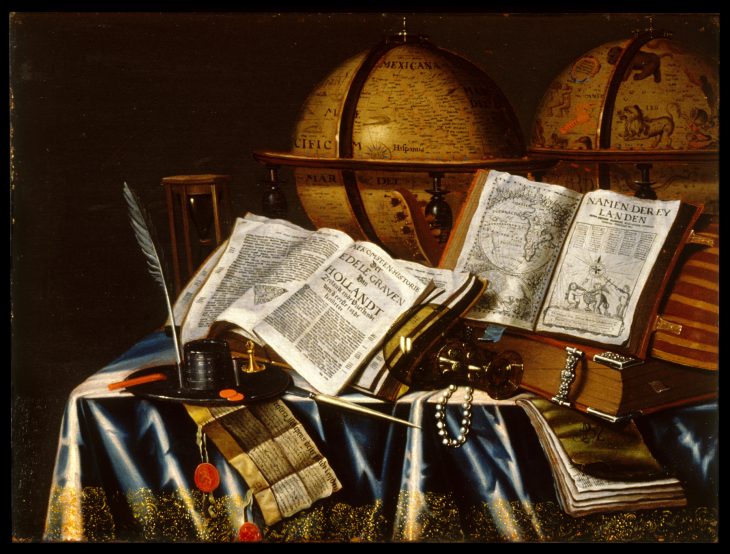
The Renaissance—An Era of Rebirth
Miranda Alexander
Recently, a dear friend asked me a question that sent my mind into a fantastic frenzy. The question: “What would you do if you could travel back in time?” I found it impossible to choose just one time period. Even now, as I reflect on the question at hand, I cannot mentally bring myself to shorten my list. There are far too many historical people and events I wish to encounter. However, I am certain of one thing, my first stop will be the Renaissance.
Why the Renaissance? Well, why not the Renaissance? It was a great time of revival and rebirth. It was a time when creativity was thriving and inspiring legendary names such as Brunelleschi, Raphael, Michelangelo, and Shakespeare. The English language also fell under the spell of this inventive era.
The enchantment began after 1588, when the naval effectiveness of England became even more proficient and opened to a world of trade. “As England imported a huge cargo of goods, English imported a huge cargo of vocabulary. Another ten to twelve thousand new words entered English in this Elizabethan and Jacobean period and delivered a new map of the world and new ideas” (Bragg 110). The French came bearing a plethora of words: “crew”, “detail”, “passport”, “progress”, “duel”, and “ticket”. Spain and Portugal gave us “armada”, “banana”, “desperado”, “guitar”, and “tobacco”.
This soon became an unbreakable and unstoppable cycle. English vessels would venture “all over the world, trading in goods, looting language” (Bragg 112). This constant cycle was not limited to the men on English ships. It was a sweet siren song that reached far past the ocean waters and beckoned English scholars, artists, and aristocrats to European shores. Their preferred destination? Italy. “They were awestruck by the architecture, the art, the music, and brought back words which described what they saw and once again provided a platform for new ideas, in this case ideas about a cultural explosion, which England so far had heard mostly from an islanded distance” (Bragg 112). Upon their return, they carried not only souvenirs, but the following words as well: “balcony”, “fresco”, “villa”, “cupola”, “portico”, “opera”, “violin”, “sonata”, and several others.
The Renaissance also witnessed a remarkable revival of Latin. “The scholars, or humanists as they came to be known, saw Latin as the language of classical thought, science and philosophy, all of which were gathering interest as the Renaissance rolled through the minds of Europe” (Bragg 113). Latin was no longer connected with suppression. Nor was it thought of as the undisputed word of God. It was a free language, welcome to finally step over the threshold between the Church and the world.
Countless Latin words bled into the English vocabulary of educated individuals: “excavate”, “horrid”, “radius”, “submerge”, and “specimen”. These new English terms, along with many more, were soon found in pamphlets, poems, and plays. “The Renaissance was a time when scholarship, the arts and intellectual pursuits in many areas were re-energized basically by the rediscovery of the classical past, much of it transferred to western Europe by Arabic translations and scholars” (Bragg 114). Science, once more, became a subject of high regard and interest. It was in both the scientific field and the medical field that Latin and Greek made their mark on English. They equipped us with “skeleton”, “tendon”, “larynx”, “tibia”, “viruses”, “capsules”, and “epilepsy”. To this day, we still use Greek and Latin for our medicine and technology.
While science and medicine both contributed greatly to the development of English, there is another key Renaissance influence I must mention. Poetry. The upper and well educated classes had a passion for embracing various aspects of the Italian culture. “In Italy they admired the way language was being explored in poetry. Poetry refined and advanced the language in a way the English admired and were determined to emulate” (Bragg 123). They desired literature that was melodic in nature and that flowed effortlessly from the tongue. Sir Philip Sidney entered the scene and swept England off her feet.
In his mid twenties, Sidney had already worked under the rule of Queen Elizabeth I as her ambassador abroad and had penned and published the greatest collection of love poems of his age. Sidney’s talent established a high standard for other poets. “The poet can make a world more beautiful than nature did: words can change the world. This was an intoxicating challenge to the educated young gallants and would-be gallants of England and they took it up” (Bragg 125). In his thirty-one years, Sidney led a life and left a rich legacy behind. The Oxford English Dictionary contains two thousand two hundred twenty-five quotations from his works. After Sidney, English poetry gained more contributors such as John Donne, Thomas Campion, and Ben Jonson. Soon poetry admirers would bow to the sublime sonnets of William Shakespeare.
I am truly in awe, when I reflect on the events and the people that played a part in advancing English. My imagination cannot help but paint beautiful, though highly unlikely scenarios. To be thrown into another time so strange to my own, and walk among the cobbled streets of England. To breathe in an air untainted by exhaust, to experience a society socially unmarred by digital contraptions. To encounter a literary mastermind and engage in conversations of love, pain, joy, despair, and all the other things that inspire. Who wants to help me build a time machine?